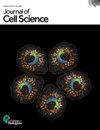朱宁病毒利用细胞内脂滴:一个依赖核蛋白的过程。
IF 3.3
3区 生物学
Q3 CELL BIOLOGY
引用次数: 0
摘要
脂滴(LDs)是一种细胞器,参与脂质储存、维持能量平衡、蛋白质螯合、信号传导和细胞器间相互作用。最近的研究表明,脂滴有利于不同病毒科(如黄病毒科和冠状病毒科)成员的复制。在这项研究中,我们发现 LDs 是阿瑞那病毒科成员所必需的细胞器。在感染胡宁乳腺病毒(JUNV)的培养物中,我们观察到病毒驱动的 LDs 数量减少,部分原因是病毒核蛋白的作用。值得注意的是,我们发现了一个新的核蛋白和病毒 RNA 池,它们定位于 LDs 附近,这表明 LDs 在病毒复制周期中发挥了作用。关于低密度脂蛋白耗竭背后的机制,我们发现有证据表明,噬脂作用参与了低密度脂蛋白的降解,降解产生的脂肪酸是脂肪酸β-氧化作用的底物,而脂肪酸β-氧化作用促进了病毒的繁殖。这项工作强调了低密度脂蛋白在 JUNV 复制周期中的重要性,有助于人们了解这些哺乳动物病毒在宿主体内引起的新陈代谢变化。本文章由计算机程序翻译,如有差异,请以英文原文为准。
Intracellular lipid droplets are exploited by Junín virus: a nucleoprotein-dependent process.
Lipid droplets (LDs) are organelles involved in lipid storage, maintenance of energy homeostasis, protein sequestration, signaling events and inter-organelle interactions. Recently, LDs have been shown to favor the replication of members from different viral families, such as the Flaviviridae and Coronaviridae. In this work, we found that LDs are essential organelles for members of the Arenaviridae family. A virus-driven reduction of LDs number was observed in cultures infected with Junín mammarenavirus (JUNV), caused in part by action of the viral nucleoprotein. To note, we identified a new pool of nucleoprotein and viral RNA that localize in the vicinity of LDs, suggesting that LDs play a role during the viral replication cycle. Regarding the mechanism behind LDs exhaustion, we found evidence that lipophagy is involved in LD degradation with the resulting fatty acids being substrates of fatty acid β-oxidation which fuels viral multiplication. This work highlights the importance of LDs during the replication cycle of JUNV, contributing to the knowledge of the metabolic changes these mammarenaviruses cause in their hosts.
求助全文
通过发布文献求助,成功后即可免费获取论文全文。
去求助
来源期刊

Journal of cell science
生物-细胞生物学
CiteScore
7.30
自引率
2.50%
发文量
393
审稿时长
1.4 months
期刊介绍:
Journal of Cell Science publishes cutting-edge science, encompassing all aspects of cell biology.
 求助内容:
求助内容: 应助结果提醒方式:
应助结果提醒方式:


